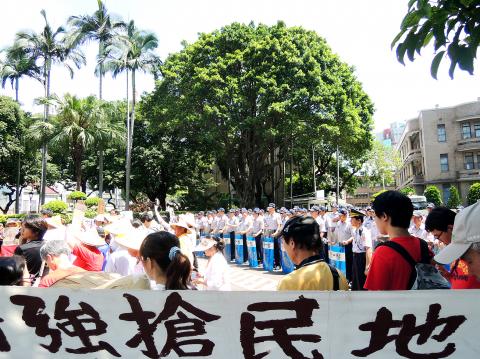Upset about Miaoli County’s renewed demolition order for the last four households in the farming village of Dapu (大埔) in Jhunan Township (竹南), affected residents and their supporters yesterday protested outside the Executive Yuan, calling on Premier Jiang Yi-huah (江宜樺) to intervene on their behalf.
Holding up a large banner that read “The Dapu dispute is not solved yet” and placards that read “Save Dapu on July 5,” dozens of people — including affected Dapu residents and supporters — rallied outside the Executive Yuan ahead of the self-demolition deadline set for Friday next week.
“The government is no different from a robber. The land on which our family house was built is for residential use, but the county government wants to flatten our home to make way for a science park,” said Ko Chih-chuan (柯智傳), one of the affected residents. “Does this make any sense to any of you?”

Photo: Taipei Times
Taiwan Rural Front chairman Hsu Shih-jung (徐世榮) said that, amid protests three years ago against land seizure by the government in Dapu to make way for a science park, Vice President Wu Den-yih (吳敦義), who was premier at the time, called a meeting attended by Miaoli County Commissioner Liu Cheng-hung (劉政鴻), Straits Exchange Foundation Secretary-General Lin Join-sane (林中森), who was the Cabinet secretary-general at the time, and Jiang, who was minister of the interior.
The meeting reached a conclusion to preserve the remaining four houses, while finding a plot of land where the affected families could relocate their houses and farms.
However, the Ministry of the Interior later decided to flatten the houses anyway and, while Dapu residents are still in the middle of an administrative lawsuit against the county government and the ministry, they received a renewed demolition order last week, asking them to demolish their own houses by July 5 or face forced demolition by the county.
“We are here because Jiang, as interior minister at the time, also made the promise along with Wu, and in fact, Wu came to the conclusion to preserve the remaining houses because the ministry said there would be no problem after an assessment,” said Liao Pen-chuan (廖本全), an associate professor at National Taipei University’s Department of Real Estate and Built Environment.
“Jiang is a liar,” he added.
Acting Construction and Planning Agency director-general Hsu Wen-lung (許文龍), who received the protesters, said that the agency would try its best to help.
“However, ultimately it is the county government that has final say,” Hsu said.

DAREDEVIL: Honnold said it had always been a dream of his to climb Taipei 101, while a Netflix producer said the skyscraper was ‘a real icon of this country’ US climber Alex Honnold yesterday took on Taiwan’s tallest building, becoming the first person to scale Taipei 101 without a rope, harness or safety net. Hundreds of spectators gathered at the base of the 101-story skyscraper to watch Honnold, 40, embark on his daredevil feat, which was also broadcast live on Netflix. Dressed in a red T-shirt and yellow custom-made climbing shoes, Honnold swiftly moved up the southeast face of the glass and steel building. At one point, he stepped onto a platform midway up to wave down at fans and onlookers who were taking photos. People watching from inside

A Vietnamese migrant worker yesterday won NT$12 million (US$379,627) on a Lunar New Year scratch card in Kaohsiung as part of Taiwan Lottery Co’s (台灣彩券) “NT$12 Million Grand Fortune” (1200萬大吉利) game. The man was the first top-prize winner of the new game launched on Jan. 6 to mark the Lunar New Year. Three Vietnamese migrant workers visited a Taiwan Lottery shop on Xinyue Street in Kaohsiung’s Gangshan District (崗山), a store representative said. The player bought multiple tickets and, after winning nothing, held the final lottery ticket in one hand and rubbed the store’s statue of the Maitreya Buddha’s belly with the other,

‘NATO-PLUS’: ‘Our strategic partners in the Indo-Pacific are facing increasing aggression by the Chinese Communist Party,’ US Representative Rob Wittman said The US House of Representatives on Monday released its version of the Consolidated Appropriations Act, which includes US$1.15 billion to support security cooperation with Taiwan. The omnibus act, covering US$1.2 trillion of spending, allocates US$1 billion for the Taiwan Security Cooperation Initiative, as well as US$150 million for the replacement of defense articles and reimbursement of defense services provided to Taiwan. The fund allocations were based on the US National Defense Authorization Act for fiscal 2026 that was passed by the US Congress last month and authorized up to US$1 billion to the US Defense Security Cooperation Agency in support of the

‘COMMITTED TO DETERRENCE’: Washington would stand by its allies, but it can only help as much as countries help themselves, Raymond Greene said The US is committed to deterrence in the first island chain, but it should not bear the burden alone, as “freedom is not free,” American Institute in Taiwan Director Raymond Greene said in a speech at the Institute for National Defense and Security Research’s “Strengthening Resilience: Defense as the Engine of Development” seminar in Taipei yesterday. In the speech, titled “Investing Together and a Secure and Prosperous Future,” Greene highlighted the contributions of US President Donald Trump’s administration to Taiwan’s defense efforts, including the establishment of supply chains for drones and autonomous systems, offers of security assistance and the expansion of